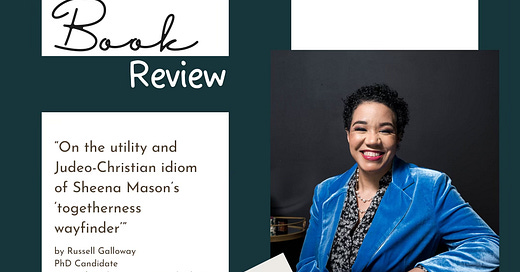On the utility and Judeo-Christian idiom of Sheena Mason’s “togetherness wayfinder”
by Russell Galloway
NEW REVIEW EXCERPT FROM OXFORD PUBLIC PHILOSOPHY REVIEW FORUM FOR THE RACELESS ANTIRACIST:
“In my estimation, as Sheena builds her case, her methods and mission could be described as a sort of secular version of “Catholic social teaching.” Inaugurated in 1891 with Pope Leo XIII’s encyclical Rerum Novarum, the tradition of Catholic social teaching (CST) discerns prescient social challenges and aims to apply a translated Christian ethic in an accessible idiom to the challenges of our (post)modern world. Concerning “racism,” CST is far from silent; Lumen Gentium, Gaudium et Spes, and pastoral letters from various Catholic prelates (whether popes and bishops) share with Sheena a tenor, trajectory, and stated aims. What, then, is their difference?
Mason maintains (with sincerity and humor) that “most people will recognize that I am as far to the left as you can be without being completely off of the spectrum” (3). She’s right about how left she is, although this does not dimmish the fact that the essence of her work betrays the patent provenance of a Christian religious framework. Consider how Chapter 10, “Home,” shares in Christ’s metaphor for ‘the wise man who built his house upon the rock.’ Concerning Christian intertextuality, G.K. Chesterton notes in his book Orthodoxy how modernity not infrequently borrows pieces of the Christian whole, adopting and adapting particulars toward an end that may look, sound, and even feel like the orthodoxy, despite sometime substantive derivations therefrom. In my judgment, this is what Mason has done with her “togetherness wayfinder.” Her substantive derivation, though, is small, if at all, given that the wayfinder traces a cultural hermeneutic whose contours convey caritas.
These configurations of Judeo-Christian charity are unsurprising, though. In the West, Jorge Luis Borges asserted, we belong to the Jews and the Greeks, and I would venture to say that the Hebrew laws concerning ontological care for the sojourners, the fatherless, and the widows shaped the West’s moral teachings more than Hellenistic virtue ethics. Indeed, when our Western ethics compassionately consider smallness, particularity, portraiture, weakness, marginality, charity, youth, or senescence (i.e. the weak, the individual), we are but participating in the Levitical law and Sermon on the Mount’s impulse of fostering solidarity and fraternal charity with manifestations of feebleness and fragmentation, as demonstrated in Christ’s Incarnation.
Sheena, then, participates (whether knowingly or unknowingly) in this deeply Christian task––creedal convictions notwithstanding. Nevertheless, the togetherness wayfinder and Christianity differ in their epistemic roots, even if they both share an essential mood of the law and the prophets, because religious orthodoxy as such does not state itself in her book. But, regardless of the epistemic roots of Mason’s mission, she presents an argumentation and conclusion that correspond mightily with Part II of the main Christian message, which is willing the good of one’s neighbor (“…and the second one is like it, you shall love your neighbor as yourself” Matt. 22.39).
Mason maintains an optimism that could lead readers to think that public opinion can be flipped to mimic like a monochromatic Othello board. In that sense, there is an aspirational arc to her theory. To the cynical reader, Mason’s optimistic call to action could sound pollyannaish. But, who cares? That is the cost of postulating in the prophetic mode, and for those fed up with skin-deep cultural criticism, Sheena’s theory is a bright spot in the theory world.
While her “togetherness wayfinder” does not deliver the fulness of what Johannine Scripture would call “the Way, the Truth, and the Life” (Jn. 14.6), Mason’s theory is unmistakenly working along those lines, offering help, hope, and healing in an academic idiom. Deft and nimble, Sheena effectively wades through the muck of race/ism and binominal racial/st theories to deliver us a love translated into theoretical terms. How much more, then, shall the wayfinder translate “race/ism” into adequate sociocultural categories that allow for fruitful conversation to flow more freely in academic, familial, residential, and religious spaces!”
Biography: Sheena Michele Mason is an assistant professor of English at SUNY Oneonta. She holds a PhD with distinction in English from Howard University in Washington, DC, USA, and specializes in Africana and American literary studies and philosophy of race. She is published with Oxford University Press, Palgrave MacMillan, Cambridge University Press, and the University of Warsaw among other presses. She is the innovator of the togetherness wayfinder (formerly and alternatively called the theory of racelessness) and founder of Togetherness Wayfinder, an educational firm. Her book The Raceless Antiracist: Why Ending Race Is the Future of Antiracism shows how ending our belief in “race” and practice of racialization is required toward the goal of ending the causes and effects of racialized dehumanization.





